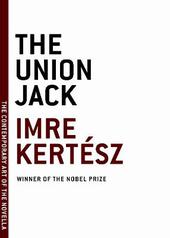
|
The Union Jack
Paperback / softback
Main Details
| Title |
The Union Jack
|
| Authors and Contributors |
By (author) Imre Kertesz
|
| Physical Properties |
| Format:Paperback / softback | | Pages:76 | | Dimensions(mm): Height 178,Width 127 |
|
| Category/Genre | Modern and contemporary fiction (post c 1945) |
|---|
| ISBN/Barcode |
9781933633879
|
| Classifications | Dewey:894.511334 |
|---|
| Audience | |
|---|
|
Publishing Details |
| Publisher |
Melville House Publishing
|
| Imprint |
Melville House Publishing
|
| Publication Date |
19 January 2010 |
| Publication Country |
United States
|
Description
In this haunting, never-before-translated autobiographical novella, an unnamed narrator recounts a simple anecdote, his sighting of the Union Jack during the Hungarian Revolution of 1956 in the few days preceding the uprising's brutal repression by the Soviet army. In telling the story, he recalls his youthful self and the intellectual and spiritual epiphanies he experienced during this time. Filled with digressive meditations on the absurd order of chance, his story is ultimately that of a gradual awakening to a kind of radical subjectivity.
Author Biography
IMRE KERT SZ was born in 1929 in Budapest. As a youth, he was imprisoned first in Auschwitz and later in Buchenwald. He worked as a journalist and playwright before publishing FATELESSNESS, his first novel, in 1975. He was awarded the Nobel Prize for Literature in 2002.
ReviewsPraise for Imre Kertesz "...An enormous effort to understand and find a language for what the Holocaust says about the human condition." -George Szirtes, Times Literary Supplement "...Searching and visionary beyond the usual parameters." -Sven Birkets, Bookforum "In explaining something of the weight and importance of Kertesz's subjects and creative achievements, it is hard to convey simultaneously the deftness and vivacity of his writing....There is something quintessentially youthful and life-affirming in this writer's sensibility..." -Ruth Scurr, The Nation "Kertesz's work is a profound meditation on the great and enduring themes of love, death and the problem of evil, although for Kertesz, it's not evil that is the problem but good." -John Banville, author of The Sea
|